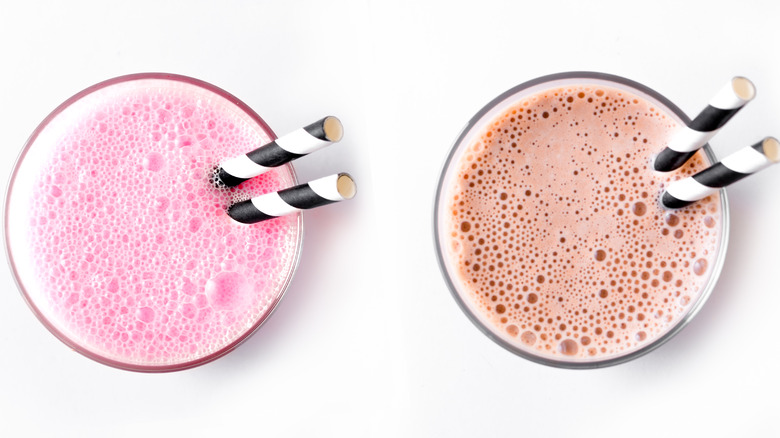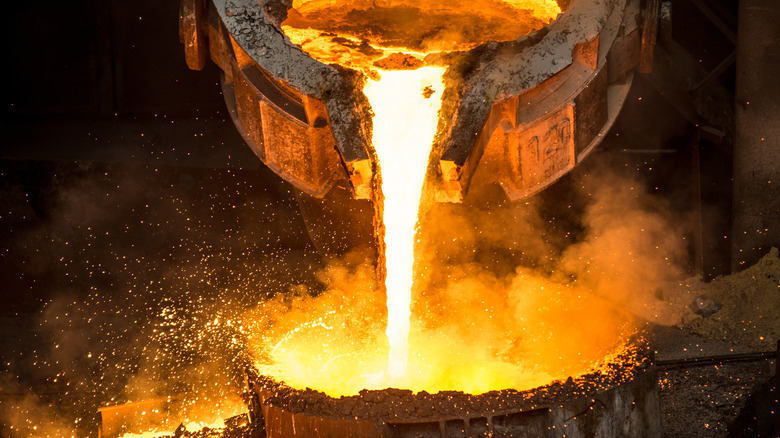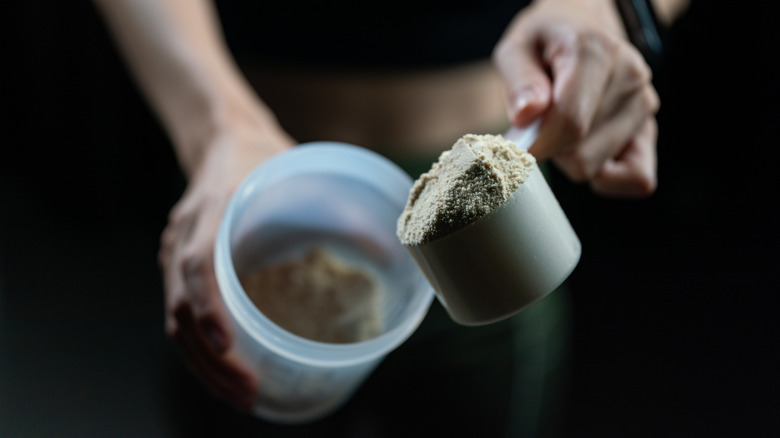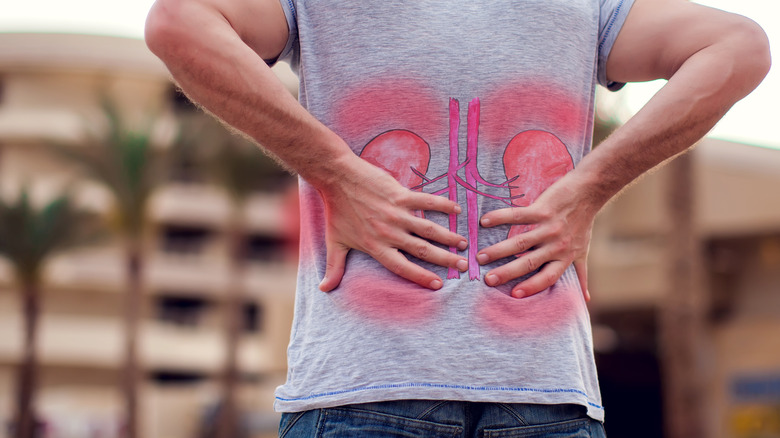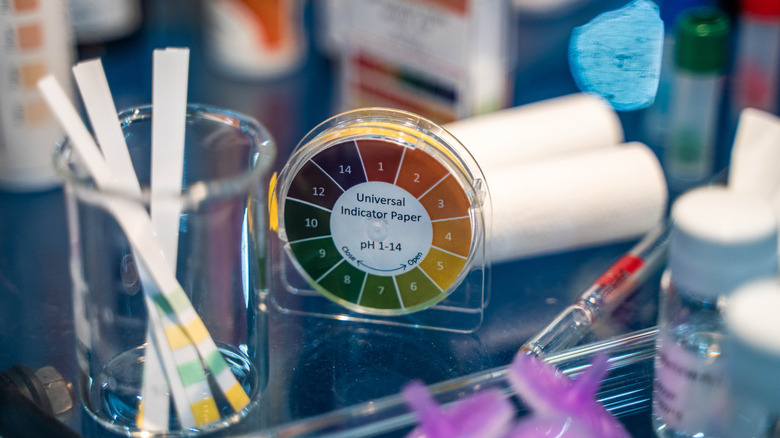When You Only Drink Protein Shakes, This Is What Happens To Your Body
Protein is one of the three macronutrients, according to Verywell Fit. However, high-protein diets come and go. Think: the keto diet, Atkins, Southbeach, et cetera. Protein's excellent reputation can mostly be attributed to the extreme marketing stunts performed to gain notoriety. Many of the trendiest diets fully omit the other two macronutrients. But protein, carbs, and fat are all equally important for overall health. You'll want to consume 0.36 grams of protein per pound of body weight, explained Healthline. Protein needs vary based on things such as your level of activity and muscle mass.
Armed with this basic knowledge, our curiosity mounted. What, we wondered, would happen to a human if they drank only protein shakes, day in and day out? We took to the internet to pick apart scientific data, firsthand accounts, and the advice of nutritionists with a variety of specialties and came away with a ton of information about what over-consuming protein can look like. Whether you consider yourself a meathead, cardio bunny, or just someone who likes to drink protein shakes, read on to discover what drinking only these delicious smoothie-like beverages could be doing to your body.
You'll certainly get enough protein
Well, duh. This seems pretty obvious. If you exclusively drink protein shakes, you will definitely hit your recommended daily allowance (RDA) of protein. This is a good thing as protein is proven to help build repair small muscle tears, which is the beneficial side effect of lifting weights, according to San Francisco Chronicle. Your body needs protein to repair the damage done by workouts. If you are highly active, you may need up to 1.6 grams of protein per kilogram of your body weight (via Medical News Today).
To calculate your protein needs, you'll first need to calculate your weight in kilograms. One pound is equal to .45 kilograms. Let's use a 120-pound, or 54.43-kilogram fitness fiend as an example. If she wants to eat 1.6 grams of protein per kilogram of her body weight, she will multiply those two figures. This provides our fictional friend with a minimum protein requirement of 87.01 grams per day.
Typical whey protein powder contains around 30 grams of protein per scoop. So, even though our gal is on the high end of needs, a mere three scoops could more than satisfy her protein needs for the day. Many plant-based protein powders contain fewer grams per scoop, but even they can provide 15 to 20 grams each. That said, if you were to exist solely on protein shakes, you'd likely be consuming far more protein than your body could even use (via San Francisco Chronicle).
Your muscles may repair faster
A complete protein is made up of all 20 amino acids. Amino acids can be split up into two categories: essential and nonessential (via Healthline). The nine essential amino acids cannot be made by your body and thus need to be consumed to create a complete protein structure. When you eat protein, it is broken down by its amino acids. Each specific compound goes forth and performs its unique job in the body. Fun fact: Every single cell in your body contains some form of protein (via Medline Plus).
When you lift weights or work out, you are essentially damaging your muscle fibers. As a response to the imposed demands, your muscle fibers can grow back stronger. This is what leads to muscular hypertrophy, per Healthline. If you provide your body with plenty of protein, your muscles will have most of the tools that they need to repair optimally (via HuffPost).
However, if you drink only protein shakes, your body will likely miss out on micronutrients. Many micronutrients are most available in colorful, nourishing, whole foods. By bypassing these health-boosting nutrients, you'd ultimately be doing your body a disservice by not providing all of the elements needed for a full recovery (via Healthline).
You might not feel quite so hungry
According to a study published in the British Journal of Nutrition, it's not necessarily the lack of carbs in a low-carb diet that contributes to weight loss. "The success of the so-called 'low carb' diet that is usually high in protein can be attributed to the relatively high-protein content per se and not to the relatively lower carbohydrate content," the study revealed.
In fact, diets higher in protein can lead to the sensation of fullness lasting longer than when one eats carbs alone. High-protein breakfasts have been proven to help curb hunger throughout the day, per Harvard Health. When consumed in moderation, protein shakes can help provide you with feelings of satiety. Satiety is defined as "the quality or state of being fed or gratified to or beyond capacity" by Merriam Webster. The more protein you eat, the less you'll feel those hunger pangs, at least to a certain extent. Still, many protein powders contain sugar or other ingredients that can mess with your overall health (via Livestrong). Be sure to consume things other than just protein shakes.
You might lose weight
A healthy mixture of all three macros, with protein at the forefront, can lead to a feeling of satiety, a 2016 study in Advances in Nutrition. If you feel less hungry because your breakfast is sticking to your ribs, you will be less inclined to pick from the pastry buffet at work. When viewed through this lens, daily protein shakes may help you lose weight.
Many fad diets include protein shakes, and the logic behind it is simple. If you replace a 500-calorie meal with 100 to 200 liquid calories, you will ultimately create a calorie deficit. If you create and maintain this deficit over time, your body will have no choice but to drop the extra poundage (via NASM).
Nevertheless, the experts at the San Francisco Chronicle caution against overconsumption of protein shakes. If that is your main source of sustenance, you are likely to be left with nutritional deficiencies. What's more, only drinking protein shakes could propel you into unsustainable diet territory. And after you inevitably go back toa more balanced way of living, you could experience weight gain (per Verywell Fit).
You could gain weight
Drinking only protein shakes may not lead to weight loss like you're hoping (via San Francisco Chronicle). Protein powders often come chock full of additives and other unwanted ingredients. They simply cannot provide enough well-rounded nutrition to be your only source of fuel. Furthermore, overdoing it on the protein shakes can lead to weight gain because they tend to be higher in calories, according to Livestrong).
It is all too easy to overconsume liquid calories because they go down oh-so-smoothly. They also do not sit like bricks in your insides. These elements combine to remind us of the golden rule in fitness and nutrition: All things in moderation. Under responsible consumption, protein shakes can lead to weight loss. Without regulation, though, they can quite easily lead to weight gain (via Mayo Clinic). The way in which you wield this power is up to you.
You could be consuming heavy metals
This is where things get a little creepy. According to Medical News Today, 2013 research linked the overconsumption of protein to kidney and bone issues and even an increased risk of cancer. An analysis by Consumer Reports revealed that some protein powders come with a side of toxic heavy metals included. Like seriously, ew, David. Among these contaminants were mercury, arsenic, cadmium, and even lead! Three servings or more of these toxic metals everyday could have life-threatening consequences, explained Medical News Today.
You may be wondering how companies can get away with selling protein powders with such scary ingredients. It's as simple as this: Because protein powders are considered a nutritional supplement, they are not regulated in the same way as food. They are subject to far fewer and more lenient testing than medications and food in the U.S. because the FDA is "not authorized to review dietary supplement products for safety and effectiveness before they are marketed." According to Medical News Today, it is best to consume protein shakes as one component of a colorful, healthy diet to avoid the negative health consequences of consuming heavy metals.
You might have gas
If you have ever slurped down a whey protein shake only to wonder why your stomach blew up like a balloon, well, rest assured that it's common. "While protein itself doesn't increase flatulence, protein supplements may contain other substances that make you gassy," according to Healthline. And if you have ever trained for a figure show or dipped your toes into the world of #gymlife, you know that to be true.
Whey protein and casein-based powders, specifically, can come with an overwhelming dose of lactose in them. Even people who eat dairy without any stinky repercussions can end up with bubble guts after a healthy dose of lactose (via Healthline). Plus, additives, which sometimes include artificial sweeteners, can make matters worse.
If you were to drink only protein shakes for the rest of your life, we would be willing to bet that your friendships may fall by the wayside. After all, only so many hours can be spent amid the toxic fumes of lactose-induced death toots.
You could have diarrhea
Diarrhea is an unpleasant but common side effect of eating too much protein or something else that doesn't totally agree with your system. Like flatulence, the occasional bout of diarrhea is typical following the consumption of protein with excess lactose or sugar alcohols (via Healthline).
According to Medical News Today, diarrhea can also be a sign of overconsumption of protein. Many athletes or people with physically demanding jobs may require more than the recommended daily amount of protein, but some people's bodies don't process a ton of protein well at all. Generally speaking, the actual protein molecules won't cause diarrhea unless consumed in excess over the long term. However, excess protein consumption has been linked to diseases (like heart disease) that reach far beyond the discomfort and nuisance of GI problems, though. With this in mind, we can assure you that only drinking protein shakes is a bad idea.
Your metabolism will experience some problems
It is difficult to get all of your nutrients through one single food source. If the only things you opt to consume all day, every day are protein shakes, your diet will likely become imbalanced (via Medical News Today). We know this seems counterproductive, especially if you are choosing to consume protein shakes for health purposes. But just because something can have health and nutrition benefits in moderation, that does not mean necessarily mean that it will remain healthy when consumed in copious amounts.
When your body isn't receiving the nutrition it needs, it can cause your metabolism to get out of whack, explained Medical News Today. This can ultimately lead to the undoing of the gains you've made. The sweeteners used in protein shakes are okay in moderation, but they can cause insulin spikes when overconsumed.
The absolute golden rule of nutrition still holds true: Eat in moderation. Too much protein can lead to everything from kidney problems to blood sugar imbalances to a severe lack of various and essential nutrients (via Medical News Today). Eat the rainbow, not just the chocolate peanut butter shake at the end.
You might burden your kidneys
Overconsuming anything can typically tax one bodily system or another. You've probably heard people joking about the damage they've done to their liver by overdoing it on alcohol. But alcohol isn't the only beverage that can cause organ damage.
If you drank only protein shakes, your kidneys would be overworked. Your kidneys are the organs that process and break down the protein you consume (per BioTech USA). When you overconsume, those little beans kick into turbo gear! Over time, this can have lasting consequences.
If you have healthy kidneys, you will have to overconsume for a long time before facing said consequences. But if you have kidney disease, a high-protein diet definitely isn't for you. The kidneys may have trouble eliminating all of the waste necessary for proper protein processing (via Mayo Clinic). Eventually, this can lead to a stark decline in health.
Too many protein shakes could lead to acidosis
Our bodies have a solid homeostatic spot that they like to live on the pH scale. Human bodies like to remain at 7.35 to 7.45 pH, with varying levels present in different systems. Slight fluctuations overall can cause serious harm, illnesses, and death (via News-Medical).
Your kidneys regulate many of the body's pH-balanced systems. If you choose to overconsume protein and overwork your kidneys, they may have trouble regulating the systems they are responsible for. Though uncommon, acidosis can happen as a result of too much protein, as a study in the Journal of the International Society of Sports Nutrition revealed. Symptoms include fatigue, weakness, irritability, difficulty losing weight, and more (Healthline).
If you want to consume a boatload of protein without forcing your body into this condition, the experts at BioTech USA recommend consuming a balanced diet. Specifically, they recommend eating a large volume of vegetables in conjunction with the protein to prevent this from happening.
Overconsumption can lead to many illnesses
While diarrhea and gas seem like lightweight side effects of consuming too much protein, bigger problems could ensue. Medical News Today states that many doctors have linked the overconsumption of protein to type 2 diabetes, cancer, and osteoporosis. The serious risks of too much protein include cardiovascular disorders, blood vessel disorders, liver disease, seizures, and even death.
While protein is necessary, it comes with a lot of waste that needs to be correctly routed through the body. When we overwhelm our processing systems by eating too much protein, they become less functional. This sets the stage for more diseases to enter. While avoiding all diseases forever may be futile, you can certainly up your chances of a long and healthy life by eating protein with intention. With great protein comes great responsibility — or something like that. The experts at Medical News Today encourage users to consume protein in moderation to avoid permanent health damage.


